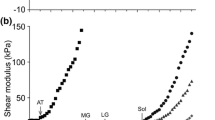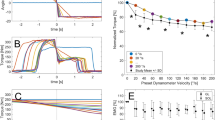Abstract
Viscoelastic properties of muscles and tendons have an important influence on human motion performance. Proper determination of these properties is essential in the analysis and modelling of human motion dynamics. The purpose of our study was to develop a method for in vivo determination of the viscoelastic properties of the entire triceps surae muscle–tendon complex (MTC) including the gastrocnemius. Ten trained male subjects participated in this study. The measurement procedure consisted of two parts: soleus and Achilles tendon stiffness and viscosity were determined in the first part while the gastrocnemius stiffness and viscosity were determined in the second part. The measurement device and the procedure have been designed in such a manner that as few human body segments move as possible during the measurement. Thus, the measurement uncertainty due to the approximation of the properties of the human body segments was minimized. Triceps surae MTC viscoelastic properties of both legs were measured for each subject. There were no significant differences in viscoelastic coefficients for left and right lower extremities; however, there were noticeable differences between subjects. The soleus stiffness coefficient was greater than the gastrocnemius stiffness coefficient by 87.6 m−1 in average. For all subjects, soleus viscosity was equal or greater than gastrocnemius viscosity. Values of viscoelastic parameters obtained by our method can be used in the analysis and modelling of human movement in situations where the knee joint is not necessarily flexed and there is coactivation of the soleus and the gastrocnemius.






Similar content being viewed by others
References
Asmussen E, Bonde-Petersen F (1974) Storage of elastic energy in skeletal muscles in man. Acta Physiol Scand 91:385–392
Aruin AS, Zatiorsky VM (1984) Biomechanical characteristics of human ankle-joint muscles. Eur J Appl Physiol 52:400–406
Bobbert MF, Gerritsen KGM, Litjens MCA, Van Soest AJ (1996) Why is countermovement jump height greater than squat jump height? Med Sci Sports Exerc 28:1402–1412
Bosco C, Komi PV (1979) Potentiation of the mechanical behaviour of the human skeletal muscle through prestretching. Acta Physiol Scand 106:467–472
Cavagna GA (1970) Elastic bounce of the body. J Appl Physiol 29:279–282
Cavagna GA, Dusman B, Margaria R (1968) Positive work done by previously stretched muscle. J Appl Physiol 24:21–32
Cnockaert JC, Pertuzon E, Goubel E, Lestienne F (1978) Series elastic component in normal human muscle. In: Asmussen E, Jorgensen MJ (eds) Biomechanics VIA. University Park Press, Baltimore, pp 73–78
Ford LE, Huxley AF, Simmons RM (1977) Tension responses to sudden length change in stimulated frog muscle fibres near slack length. J Physiol (Lond) 269:441–515
Fukashiro S, Okada J, Fukunaga T (1995a) Contribution of series elastic component in elbow flexion using stretch-shortening cycle. In: Hakkinen K, Keskinen KL, Komi PV, Mero A (eds) The XVth congress of the ISB, book of abstracts. Gummerus Kirjapaino, Jyvaskyla, Finland, pp 292–293
Fukashiro S, Itoh M, Ichinose Y, Kawakami Y, Fukunaga T (1995b) Ultrasonography gives directly but noninvasively elastic characteristic of human tendon in vivo. Eur J Appl Physiol 71:555–557
Fukashiro S, Noda M, Shibayama A (2001) In vivo determination of muscle viscoelasticity in the human leg. Acta Physiol Scand 172:241–248
Gregor RJ, Komi PV, Browing RC, Jarvinen M (1991) A comparison of the triceps surae and residual muscle moments at the ankle during cycling. J Biomech 24:287–297
Herzog W, Guimaraes ACS, Zhang YT (1995) Emg. In: Nigg BM, Herzog W (eds) Biomechanics of the musculo-skeletal system. Willey, Chichester, UK, pp 349–375
Hunter IW, Kearney RE (1983) Invariance of ankle dynamic stiffness during fatiguing muscle contractions. J Biomech 16:985–991
Lafortune MA, Henning ME, Lake MJ (1996) Dominant role of interface over knee angle for cushioning impact loading and regulating initial leg stiffness. J Biomech 29:1523–1529
Morgan L (1977) Separation of active and passive components of short–range stiffness of muscle. Am J Physiol 232:C45–C49
Murray MP, Guten GN, Baldwin JM, Gardner GM (1976) A comparison of plantar flexion torque with and wthout the triceps surae. Acta Orthop Scand 47:122–124
Pousson M, van Hoecke J, Goubel F (1990) Changes in elastic characteristics of human muscle induced by eccentric exercise. J Biomech 23:343–348
Proske U, Morgan L (1987) Tendon stiffness: Methods of measurement and significance for the control of movement. A review. J Biomech 20:75–82
Rack PMH, Westbury DR (1984) Elastic properties of cat soleus tendon and their functional importance. J Physiol (Lond) 347:479–495
Shorten MR (1985) Mechanical energy changes and elastic energy storage during treadmill running. In: Winter DA, Norman RW, Wells R, Hayes KC, Patla A (eds) Biomechanics IXB. Human Kinetics, Champaign, Ill., pp 313–318
Shorten MR (1987) Muscle elasticity and human performance. Med Sport Sci 25:1–18
Siegler S, Moskowithz GD, Freedman W (1984) Passive and active components of the internal moment developed about the ankle joint during human ambulation. J Biomech 17:647–652
Van Ingen Schenau GJ, Dorssers WMN, Welter TG, Beelen A, Groot G, Jacobs R (1995) The control of mono-articular muscles in multijoint leg extensions in man. J Physiol (Lond) 484:247–254
Zatsiorski V, Seluyanov V (1983) The mass and inertial characteristics of the main segments of the human body. In: Matsui H, Kobayashi K (eds) Biomechanics VIII-B. Human Kinetics, Champaign, Ill., pp 1152–1159
Author information
Authors and Affiliations
Corresponding author
Rights and permissions
About this article
Cite this article
Babic, J., Lenarcic, J. In vivo determination of triceps surae muscle–tendon complex viscoelastic properties. Eur J Appl Physiol 92, 477–484 (2004). https://doi.org/10.1007/s00421-004-1107-4
Accepted:
Published:
Issue Date:
DOI: https://doi.org/10.1007/s00421-004-1107-4




